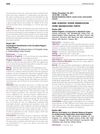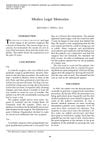 January 2022 in “International journal of research in medical sciences and technology”
January 2022 in “International journal of research in medical sciences and technology” Ayurveda offers a safer and effective way to manage Seborrheic dermatitis without severe side effects.
 January 2021 in “International journal of basic and clinical pharmacology”
January 2021 in “International journal of basic and clinical pharmacology” Hydroxychloroquine is less effective than betamethasone oral mini pulse therapy for treating alopecia areata.
 July 2018 in “Journal of College of Medical Sciences-nepal”
July 2018 in “Journal of College of Medical Sciences-nepal” Women with certain types of hair loss may have low iron levels.
 November 2017 in “Pediatrics in Review”
November 2017 in “Pediatrics in Review” A 4-year-old girl with hair loss was diagnosed with early-onset trichotillomania and improved with behavioral interventions.
 August 2016 in “Journal of Investigative Dermatology”
August 2016 in “Journal of Investigative Dermatology” The enzyme CD73 helps control human hair growth and could be targeted to treat hair growth disorders.
 March 2014 in “Journal of The American Academy of Dermatology”
March 2014 in “Journal of The American Academy of Dermatology” TNF-a may not be as involved in certain types of hair loss as previously thought.

The data suggests that dosing differences can help manage spasticity in patients with upper motor neuron dysfunction.
 January 2010 in “Elsevier eBooks”
January 2010 in “Elsevier eBooks” Hair transplantation is a treatment for hair loss mainly caused by genetics, with various techniques and potential complications, and results visible after 8-12 months.
 June 2008 in “British Journal of Dermatology”
June 2008 in “British Journal of Dermatology” UK medical students lack dermatology education, liver biopsy patients with risk factors show more fibrosis, and certain fungi resist drugs due to melanin; genetics may influence female hair loss.
 January 2005 in “Pediatric Dermatology”
January 2005 in “Pediatric Dermatology” Alopecia areata in infants may be more common than previously thought.
 September 2003 in “Journal of the Royal Society of Medicine”
September 2003 in “Journal of the Royal Society of Medicine” Doctors should set boundaries and seek outside help for family medical issues.
 June 2001 in “International Journal of Cosmetic Surgery and Aesthetic Dermatology”
June 2001 in “International Journal of Cosmetic Surgery and Aesthetic Dermatology” Dr. Shiell concludes that good communication, proper training, and thorough documentation can help avoid legal issues in cosmetic surgery.
 September 1983 in “Journal of The American Academy of Dermatology”
September 1983 in “Journal of The American Academy of Dermatology” Experts discussed hair care, genetic hair defects, hair loss treatments, nail surgery, lupus treatments, skin infections, and cosmetic allergies.
 254 citations,
September 2014 in “Menopause”
254 citations,
September 2014 in “Menopause” The NAMS 2014 recommendations guide healthcare providers on treating health issues in midlife women, emphasizing individualized care and informed decision-making.
 179 citations,
October 2018 in “American Journal of Clinical Dermatology”
179 citations,
October 2018 in “American Journal of Clinical Dermatology” Cancer treatments targeting specific cells and the immune system can cause skin, mouth, hair, and nail problems, affecting patients' quality of life and treatment adherence.
 165 citations,
January 2014 in “Dermatology Research and Practice”
165 citations,
January 2014 in “Dermatology Research and Practice” Zinc is effective for treating various skin conditions, including warts and acne.
 148 citations,
February 2005 in “Autoimmunity Reviews”
148 citations,
February 2005 in “Autoimmunity Reviews” Most people with systemic lupus erythematosus have skin problems, and skin symptoms are often the first sign of the disease.
 112 citations,
October 2005 in “Mayo Clinic Proceedings”
112 citations,
October 2005 in “Mayo Clinic Proceedings” Minoxidil and finasteride can slow hair loss and stimulate regrowth, but won't restore all lost hair or reverse complete baldness.
 109 citations,
December 1998 in “The Journal of Dermatology”
109 citations,
December 1998 in “The Journal of Dermatology” Manipulating the catagen and telogen phases of hair growth could lead to treatments for hair disorders.
 99 citations,
December 2010 in “Journal of The European Academy of Dermatology and Venereology”
99 citations,
December 2010 in “Journal of The European Academy of Dermatology and Venereology” The document concludes that certain genetic mutations and dietary factors are involved in acne development, and treatments like isotretinoin and diet changes can help manage it.
 89 citations,
May 1999 in “Allergy”
89 citations,
May 1999 in “Allergy” The yeast Pityrosporum ovale can cause skin allergies and infections, and antifungal treatments like ketoconazole are effective against it.
 87 citations,
December 2016 in “British journal of dermatology/British journal of dermatology, Supplement”
87 citations,
December 2016 in “British journal of dermatology/British journal of dermatology, Supplement” Cancer patients treated with immune checkpoint inhibitors may develop alopecia, but some hair regrowth is possible with treatment.
55 citations,
March 2000 in “American journal of clinical dermatology” Antiandrogens, particularly flutamide and CPA, are most effective for treating hirsutism, with long-term use needed for best results.
 52 citations,
June 1981 in “International Journal of Dermatology”
52 citations,
June 1981 in “International Journal of Dermatology” Oral retinoids are effective for severe skin conditions but require careful use due to side effects.
 49 citations,
September 2012 in “The Journal of clinical endocrinology and metabolism/Journal of clinical endocrinology & metabolism”
49 citations,
September 2012 in “The Journal of clinical endocrinology and metabolism/Journal of clinical endocrinology & metabolism” The document concludes with guidance for doctors on diagnosing and treating hirsutism effectively and safely.
 47 citations,
January 2001 in “Journal of Investigative Dermatology”
47 citations,
January 2001 in “Journal of Investigative Dermatology” High testosterone to epitestosterone ratio in hair could predict male-pattern baldness.
 38 citations,
February 2012 in “Aesthetic Surgery Journal”
38 citations,
February 2012 in “Aesthetic Surgery Journal” Facial rejuvenation surgery has evolved to yield natural results with low complication rates, and more men and older patients are choosing this surgery.
 36 citations,
January 2012 in “International Journal of Trichology”
36 citations,
January 2012 in “International Journal of Trichology” Losing eyelashes or eyebrows can be a sign of many different health problems and needs a careful approach to treat effectively.
 36 citations,
May 2011 in “The Journal of Clinical Endocrinology & Metabolism”
36 citations,
May 2011 in “The Journal of Clinical Endocrinology & Metabolism” Treatment with a hormone agonist can reduce excess male hormones in postmenopausal women without surgery.
 31 citations,
October 2002 in “Dermatologic Surgery”
31 citations,
October 2002 in “Dermatologic Surgery” Minoxidil helps stabilize hair loss, increase density, and reduce shedding after hair transplant surgery.





























